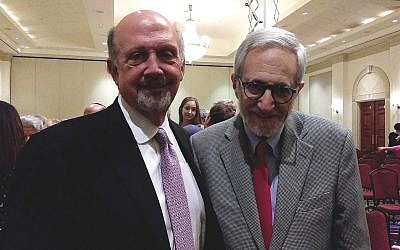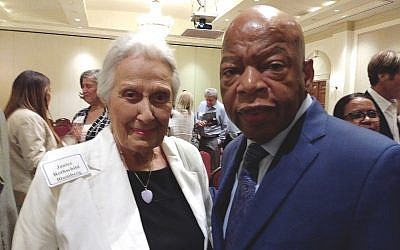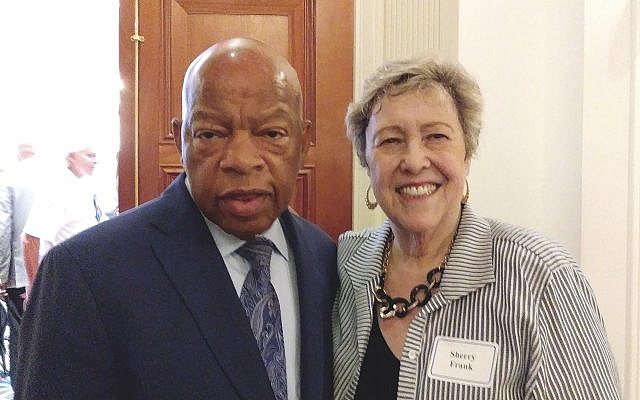“Shared Legacies” Tells History of Blacks, Jews
Key community members come together to raise money to produce film that helps to bridge the divide.
Patrice Worthy is a contributor at the Atlanta Jewish Times.
Dr. Martin Luther King Jr. stood at the pulpit of Dexter Avenue Baptist Church in Montgomery, Ala., his voice rising like the blast of a shofar as he preached from the Old Testament.
“I’d like to use, as a basis of our thinking together, a story that has long since been stenciled on the mental sheets of succeeding generations. It is the story of the Exodus, the story of the flight of the Hebrew people from the bondage of Egypt through the wilderness, and finally to the promised land.”
Young Jews who traveled to Montgomery to participate in the civil rights movement were moved to learn the foundation for the most pivotal moment in American history was rooted in Hebrew text.
The bond between blacks and Jews during the civil rights movement is the subject of the film “Shared Legacies: Extraordinary Moments in the Black and Jewish Civil Rights Alliance.” Filmmaker Shari Rogers was inspired to document the relationship between the two communities after visiting the Charles H. Wright Museum of African American History in Detroit. There she met Clarence B. Jones, King’s attorney and speechwriter. Jones informed Rogers that King charged him with telling the black community about the “24/7 support” Jews gave blacks during the civil rights movement. Rogers decided to launch the company Spill the Honey after hearing the story of Eliezer Ayalon, a Holocaust survivor who chose to live a life of sweetness. She uses the platform to promote the shared experiences of blacks and Jews because she says it’s a part of history that goes overlooked.
“When I talk to young Jewish people under 40 they don’t know about this history,” Rogers said. “This history is important because it is a template we can look at in consensus building.”

Many of the Jews who came to America had a parent or grandparent in the Holocaust and couldn’t believe what was happening to blacks in America, Rogers said. “Not all, but many. It was hard for the rabbis. A temple was bombed in Birmingham and The Temple here in Atlanta was bombed for supporting the Civil Rights Movement.”
During a preview of the film at The Temple, pioneers and supporters of the civil rights movement gathered to recall how Jews and blacks worked together to end the injustice of the Jim Crow South. Sherry Frank, Congressman John Lewis, Rabbi Alvin Sugarman, Rev C.T. Vivian, Hank Thomas, Janice Rothschild Blumberg and others spoke to attendees about the importance of the relationship.
“It’s wonderful to look at history and be inspired by history and know that things can change,” Sugarman said. “If there was ever a time when hands and hearts were locked together it was blacks and Jews during the civil rights movement.”
Through archival footage and interviews, the film captures how the “Jewish presence” during the civil rights movement was instrumental in breaking down racial barriers. Rogers revealed how Jews were key in the desegregation of whites-only lunch counters because many of the department store restaurants were owned by “compassionate Northern Jews.” She identified the Jewish lawyers who fought high-profile civil rights cases such as Jack Greenberg, one of the lawyers who argued Brown v. Board of Education of Topeka, Kan., resulting in the desegregation of public schools.
Scenes from Rabbi Abraham Joshua Heschel marching with Dr. King show how Jewish camaraderie was visible in the face of oppression. The film also includes the controversial dinner organized by Rabbi Jacob Rothschild and his wife, Janice Rothschild Blumberg, in honor of Dr. King receiving the Nobel Peace Prize. The event was the first public, integrated dinner in Atlanta. Rogers also takes viewers behind the scenes in Washington, D.C. to show how the power and influence of Joe Rauh, Marvin Caplan and Arnold Aronson led to the passage of the Civil Rights Act of 1964.

And although there was already a hidden coalition between blacks and Jews, Lewis said he and Frank founded the Atlanta Black-Jewish Coalition because they wanted to make it official.
“We wanted to make it visible and show that blacks and Jews were working to keep the rage of anti-Semitism from emerging in the black community,” Lewis said. “A lot of young people don’t know their history that blacks and Jews struggled together. It’s not being taught in our public schools, so we have to tell the story over and over and over again.”




comments